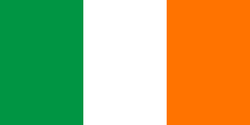| The following page(s) contains fictitious world events as background material for the Twilight:2000 role-playing game. These events should not be confused with their real life counterparts. People and places shown should in no way be thought of as accurate representations of anything living, dead or undead. |

|
This page uses content from Wikipedia. The original article was at Republic of Ireland. The list of authors can be seen in the page history. As with Twilight 2000 Wiki, the text of Wikipedia is available under the GNU Free Documentation License. This article may need to be modified to reflect the Twilight 2000 world. |

Irish Flag
Ireland is a country in north-western Europe. The modern sovereign state occupies about five-sixths of the island of Ireland, which was first partitioned on 3 May 1921. It is bordered by Northern Ireland - part of the United Kingdom - to the north, by the Atlantic Ocean to the west, the Irish Sea to the east and the Celtic Sea and St George's Channel to the South and South-East. The legal name of the state is simply "Ireland", but its legal description "the Republic of Ireland" is sometimes used to differentiate the state from the island.
On 29 December 1937 Ireland became the successor-state to the Irish Free State, itself established on 6 December 1922. Ireland is a member of the EU, the OECD, and the UN. Ireland's policy of neutrality means it is not a member of NATO, although it does contribute to peacekeeping missions sanctioned by the UN.
Military[]
Ireland's armed forces are organised under the Irish Defence Forces (Óglaigh na hÉireann). The Irish Army is relatively small compared to other neighbouring armies in the region, but is well equipped, with 8,500 full-time military personnel (13,000 in the reserve army). This is principally due to Ireland's policy of neutrality, and its "triple-lock" rules governing participation in conflicts whereby approval must be given by the UN, the Government and the Dáil before any Irish troops are deployed into a conflict zone. Deployments of Irish soldiers cover UN peace-keeping duties, protection of Ireland's territorial waters (in the case of the Irish Naval Service) and Aid to Civil Power operations in the state.
There is also an Irish Air Corps, Irish Naval Service and Reserve Defence Forces (Irish Army Reserve and Naval Service Reserve) under the Defence Forces. The Irish Army Rangers is a special forces branch which operates under the aegis of the army.
The Republic's air facilities were used by the US military for the delivery of military personnel involved in the 2003 invasion of Iraq through Shannon Airport; previously the airport had been used for the invasion of Afghanistan in 2001, as well as the First Gulf War. This is part of a longer history of use of Shannon for controversial military transport, under Irish military policy which, while ostensibly neutral, was biased towards NATO during the Cold War. During the Cuban Missile Crisis, Seán Lemass authorised the search of Cuban and Czech aircraft passing through Shannon and passed the information to the CIA.
Twilight War History (1st & 2nd Edition)[]
Violent clashes between protestants and catholics in Northern Ireland get worse. Many catholics consider the police and Ulster Defence Regiment to be puppets of the protestants, and call for help from the Republic of Ireland. This call is answered as the Irish army moves into the border counties.
The UDR managed to halt the Irish army's advance. As winter approached, both sides concentrated on feeding their people and the war effectively stopped, but the IRA started fighting a guerilla war.
The IRA maintained its guerilla war, despite UDR and police attempts to break it. The Irish Army launched an unsuccesful attack in April, and the UDR counter-attacked in May, pushing the Irish back along the whole front.
The Irish Army launched a surprise attack during the winter. Surprise allowed the Irish to make gains, but the weather worked against them, limiting their success. In the summer, the UDR launched an offensive, but made few gains.